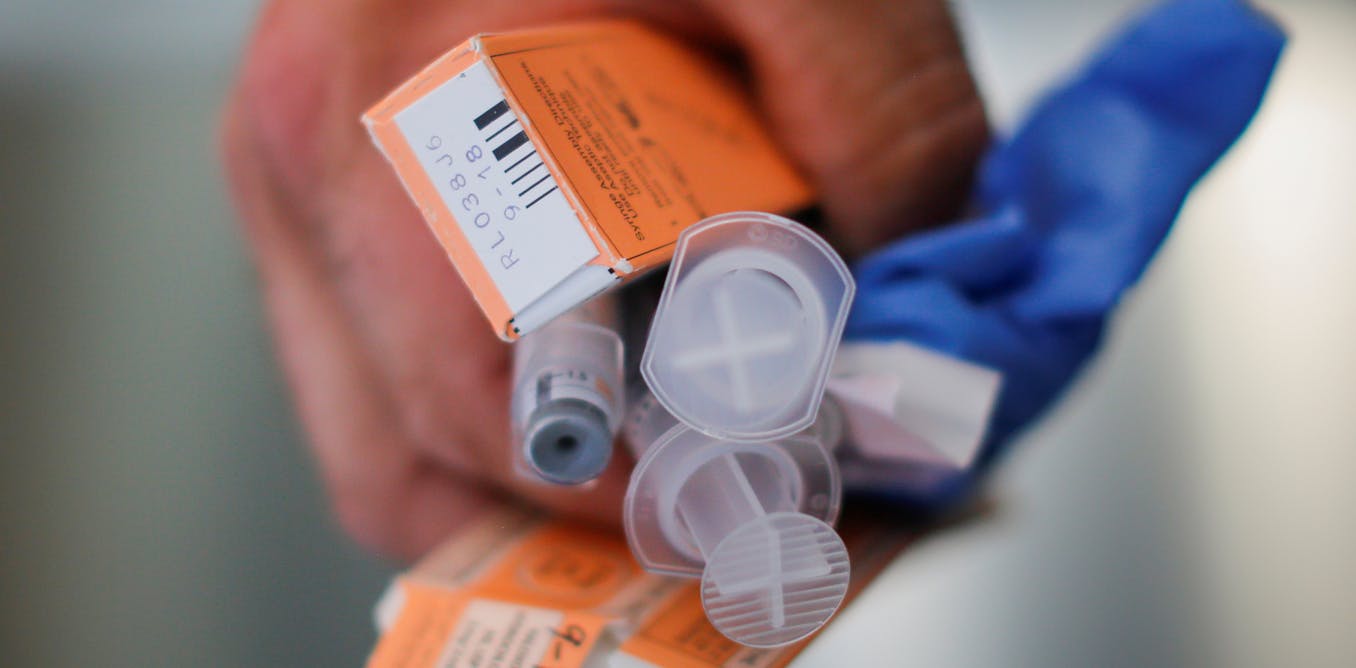

Every day, 91 Americans die from an opioid overdose. Rates of abuse of these drugs have shot up over the past 15 years and continue to climb.
Why is this happening? Is there hope for helping individuals with opioid addiction?
From a scientific standpoint, addiction is a disease. And, as researchers who study opioid addiction, we’re hopeful about where epigenetics, the science of how DNA code is regulated, can lead us.
This research could one day unlock preventative therapeutics – treatments that not only help those currently struggling with substance abuse but protect future generations.
Nature and nurture
Just as genetics can affect a person’s risk for heart disease, cancer or diabetes, it can also make them more or less susceptible to addiction.
A great deal of research in the last decade has focused on tiny differences in a person’s DNA – termed single-nucleotide polymorphisms, or SNPs. These SNPs can indicate whether you have a higher or lower rick for addiction.
For example, some people have an opioid receptor gene with a single building block change that protects them against substance dependence in general and opioid dependence in particular. Conversely, variations in genes for three different dopamine receptors – the molecules responsible for signaling pleasure in the brain – are linked to increased risk for opioid addiction.
Environment matters, too. Your parents’ or grandparents’ experiences can affect the way your genetics are expressed years down the line. For example, say you have a dopamine receptor SNP that makes you more likely to develop an addiction. While it’s useful to know that you’re at greater risk, if that gene is “read” differently by your body’s cells due to epigenetic changes, then that risk may not impact your life.
Exposure to drugs like opioids can cause significant epigenetic changes across generations. In one study, we gave opioids to a group of female rats for just 10 days during adolescence, while another group of female rats didn’t receive any. The rats then remained drug-free until adulthood.
The children of the rats who received opioids were actually less susceptible to opioid addiction. In tests, they were not willing to search as hard for opioids and found opioids less rewarding. In addition, the brains of these offspring – and their offspring – expressed genes differently from their peers.
Why did this happen? It was the result of epigenetic changes. The mother rat’s childhood exposure to opioids changed how their children’s DNA was “read.” In this case, the epigenetic changes helped to prepare the offspring for an environment that they were likely to encounter. The parents’ experiences had changed the way cells in their offspring read their DNA code, lessening their susceptibility to addiction and adapting them to a world with opioids.
This rodent experiment shows how one generation’s experiences can change the destiny of the next generation. However, in humans, the situation can be far more complicated. Scientists haven’t yet studied the role of epigenetics in human substance abuse. But they have observed epigenetic effects in complex diseases like obesity.
Knowing the risks
Early research suggests that people born into a culture of drug use may be more inclined to get and stay sober. While still unclear, epigenetics may play a role.
In the meantime, hearing about the science of genetics and epigenetics may help people with substance use disorders in unexpected ways.
One therapeutic approach for substance use disorder that’s now popular is cognitive behavioral therapy. This focuses on strengthening an individual’s problem-solving abilities in order to change their thinking and behavioral patterns.
One vital tool entails using predictive language to instill hope in patients – for example, reminding them of the skills they already have within them to prevent relapse and pointing out where those skills have helped them survive so far. For people with a generational exposure to opioids, the knowledge that they may actually have biology on their side to stay opioid-free could lead to better outcomes by giving them a psychological boost.
Could communicating basic science findings regarding protective epigenetic changes help tip the scales? While this is still a theory, scientists are currently evaluating a similar approach for diabetes and coronary heart disease. Perhaps communicating about genetic predisposition can help individuals stick to their treatment programs and reduce their risk of complications.
A treatment for addiction
Epigenetics research may also lead us to develop new medications.
Clinicians already use personalized medicine to treat nicotine addiction. In this case, a doctor will prescribe different medication to an individual trying to quit smoking, depending on his or her genes.
Better understanding of genetics and opioid addiction may lead to similar approaches. Since we are just beginning to understand how epigenetics impacts opioid addiction, such treatments are likely years away. The first step is to understand which genes are responsible for making offspring more resistant, like the rats in our study, and how these genes then impact brain function and addictive behaviors.
![]()
![]()
Jill Turner, Assistant Professor of Pharmacy, University of South Carolina; Fair Vassoler, Research Assistant Professor of Biomedical Sciences, Tufts University, and Kathleen Chiasson-Downs, Clinical Therapist, West Virginia University
This article was originally published on The Conversation. Read the original article.

